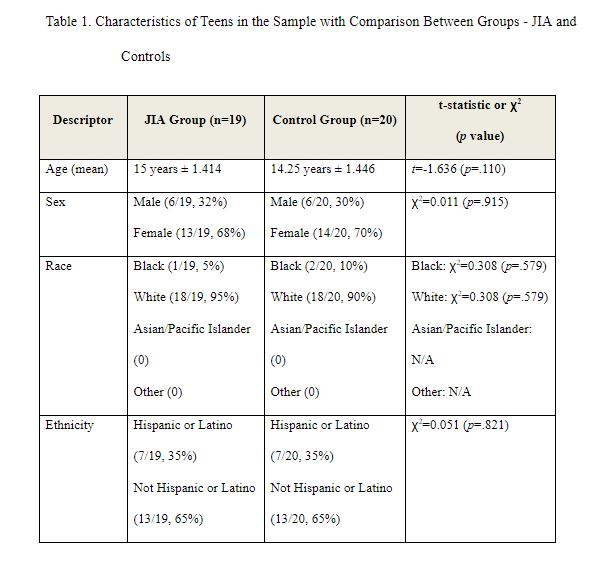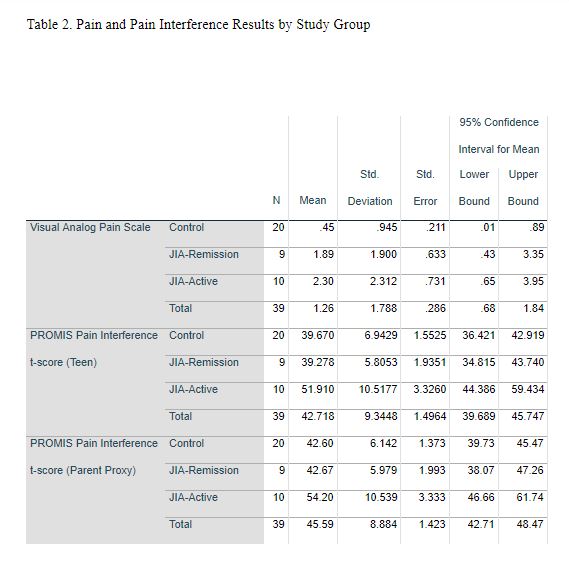Session Information
The 2020 Pediatric Rheumatology Symposium, originally scheduled for April 29 – May 2, was postponed due to COVID-19; therefore, abstracts were not presented as scheduled.
Date: Saturday, May 2, 2020
Title: Poster Session 3
Session Type: ACR Abstract Session
Session Time: 4:15PM-5:15PM
Background/Purpose: The purpose of this study is to define the relationships between pain and carbohydrate metabolism in teens with active juvenile idiopathic arthritis (JIA), teens with JIA in remission, and healthy controls. Pain is the most commonly reported symptom for teens with JIA, the most common rheumatic disease in teens. JIA is defined by persistent joint swelling, often accompanied by pain, heat, limited range of motion, erythema, or loss of use, with onset prior to age 16 years. Dietary modifications are popular complementary and alternative medicine approaches to pain management for teens with JIA, yet there is limited high-quality evidence about the effects of low-carbohydrate or low-sugar diets.
Methods: This pilot study was a case-control, cross-sectional design (N=39 teens age 13-17) comparing pain, pain interference, individual and disease-related factors, behaviors, and biomarkers for teens with active JIA (n=10), clinical remission (n=9), and healthy controls (n=20). Participants were recruited through a pediatric rheumatology clinic in Central Texas. All participants in the JIA group meet ACR criteria for JIA diagnosis. Pain was measured using a visual analog pain scale and the PROMIS pain interference scales. Dietary intake was measured via a detailed 3-day food record and analyzed by trained clinicians using the Nutrition Data System for Research software. Blood metabolites were analyzed using mass spectroscopy. Analysis of variance methods and t-tests were used to determine differences between groups. Correlations were used to measure relationships between variables, and multiple regression was used to evaluate the predictive model.
Results: There was no statistically significant difference in sample characteristics between groups at baseline (Table 1). Pain and pain interference results are presented in Table 2. Pain and carbohydrate intake are highly correlated in teens with active JIA (r=0.763, p< 0.05). Study groups were equivalent at baseline in dietary intake, but males consumed more total energy and all nutrients than females (p< 0.05). Controlling for sex, predictive models of added sugars and carbohydrate intake significantly predicted pain scores in teens with active JIA (F(3, 35)=4.185, p=0.012, R2=0.264). At the time of submission, blood metabolite analysis is in-process.
Conclusion: In teens with active JIA disease in our study, pain and carbohydrate intake are strongly positively related. Carbohydrate and sugar intake predicted pain in teens with active disease. This pattern was not observed in teens in clinical remission or controls. These findings have implications for pain management in teens with JIA. Blood metabolite analysis is in progress, but it is possible that the results may further elucidate the relationships between pain and carbohydrate intake. Further research is warranted to confirm these findings in a larger sample.
To cite this abstract in AMA style:
Lewis K, Osier N, Carter P, Nguyen C, Carrasco R, Brooks S, Garcia A, Tiziani S. Carbohydrate and Sugar Intake Predict Pain in Teens with Active JIA Disease but Not in Teens in Remission or Controls: A Cross-Sectional, Case-Control Metabolomics Pilot Study [abstract]. Arthritis Rheumatol. 2020; 72 (suppl 4). https://acrabstracts.org/abstract/carbohydrate-and-sugar-intake-predict-pain-in-teens-with-active-jia-disease-but-not-in-teens-in-remission-or-controls-a-cross-sectional-case-control-metabolomics-pilot-study/. Accessed .« Back to 2020 Pediatric Rheumatology Symposium
ACR Meeting Abstracts - https://acrabstracts.org/abstract/carbohydrate-and-sugar-intake-predict-pain-in-teens-with-active-jia-disease-but-not-in-teens-in-remission-or-controls-a-cross-sectional-case-control-metabolomics-pilot-study/


